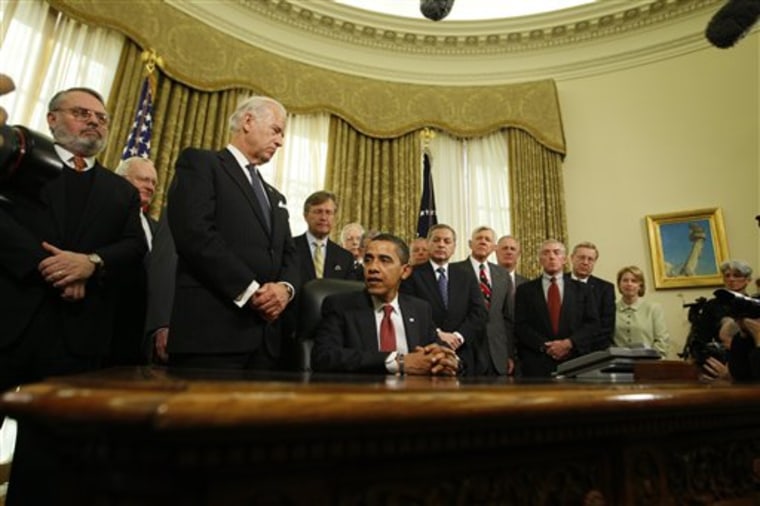President Barack Obama on Thursday moved quickly to undo a contentious Bush administration national security program, ordering the CIA to close down secret overseas prisons and the Pentagon to close down the Guantanamo prison within a year. The president also banned the harshest interrogation methods.
The CIA has used secret "black site" prisons around the world to question terror suspects, usually plucking them from one country and moving them to another where U.S. agents operated a prison. A senior White House source said the CIA will be allowed to continue these "renditions" but not to countries that torture and not to its own prisons.
With three executive orders and a presidential directive signed in the Oval Office Thursday, Obama started reshaping how the United States prosecutes and questions al-Qaida, Taliban or other foreign fighters who pose a threat to Americans.
The centerpiece order would close the much-maligned U.S. prison at Guantanamo Bay, Cuba — a complicated process with many unanswered questions that was nonetheless a key campaign promise of Obama's. The administration already has suspended trials for terrorist suspects at Guantanamo for 120 days pending a review of the military tribunals.
"We intend to win this fight. We're going to win it on our terms," Obama said of the war on terrorism. But he also said he didn't want to have to make a "false choice" between successfully waging war against terrorist organizations and hewing to U.S. human rights ideals in the process.
'Founding Fathers' cited
"This is following through not just on a commitment I made during the campaign but an understanding that dates back to our Founding Fathers, that we are willing to observe core standards of conduct — not just when it's easy but also when it's hard," the president said.
"We will be setting up a process" to figure out the logistics of closing down Guantanamo, Obama told reporters gathered in the Oval Office of the White House.
In related actions, Obama:
- Created a task force that would have 30 days to recommend policies on handling terror suspects who are detained in the future. Specifically, the group would look at what do do with the 245 Guantanamo detainees.
- Required all U.S. personnel to follow the U.S. Army Field Manual while interrogating detainees. The manual explicitly prohibits threats, coercion, physical abuse and waterboarding, a technique that creates the sensation of drowning and has been termed a form of torture by critics. However, a Capitol Hill aide says that the administration also is planning a study of more aggressive interrogation methods that could be added to the Army manual — which would create a significant loophole to Obama's action Thursday.
- Directed the Justice Department to review the case of Qatar native Ali al-Marri, who is the only enemy combatant currently being held on U.S. soil. The directive will ask the high court for a stay in al-Marri’s appeals case while the review is ongoing. The government says al-Marri is an al-Qaida sleeper agent.
At Guantanamo Bay, reaction was mixed to the prison closure.
"Let’s hope that if we return, this will be a museum memorializing a really shameful chapter in American history," said Stacy Sullivan of New York-based Human Rights Watch, who was at the war crimes trials as an observer.
Defense attorney Brian Mizer — a Navy lieutenant commander — called the order "a great day for America."
But prosecutor Jeff Groharing said he hopes the military trials will resume. Victims of terrorist attacks "need justice to be done," the Marine major said.
Economic tensionThe Republican opposition in Congress, meanwhile, said it would seek a meeting with Obama to voice growing concerns about portions of his plan to spend $825 billion in a bid to reverse the country's perilous economic slide.
House Republican Whip Eric Cantor of Virginia said his party wanted to work with the new administration, but that many facets of the stimulus program wending its way through Congress would not create jobs, a vital requirement as unemployment numbers climb. Cantor spoke on CBS television Thursday.
Obama on Thursday was also visiting the State Department to meet with Secretary of State Hillary Rodham Clinton and his top national security advisers.
Mitchell tapped for MideastObama used that appearance to name George Mitchell, the former Senate Democratic leader, to serve as special Mideast envoy, a step to make good on a campaign pledge to be more robustly involved in efforts to help with peace efforts in the volatile region.
Mitchell, 75, returns to a role he pursued during President Bill Clinton's presidency when the former senator took on several difficult diplomatic assignments, including chairing peace talks on Northern Ireland.
Mitchell also led an international commission to investigate violence in the Middle East. His report, issued in spring 2001, after Clinton had left office, called for a freeze on Israeli settlements on the West Bank and a Palestinian crackdown on terrorism.
Obama has vowed to move swiftly to meet challenges in the Middle East and other troubled overseas regions.
Richard Holbrooke, former U.S. ambassador to the United Nations, was named Obama's special envoy to Pakistan and Afghanistan.
On his first full day in office, Obama made telephone calls Wednesday to Egyptian President Hosni Mubarak, Israeli Prime Minister Ehud Olmert, Jordan's King Abdullah and Palestinian President Mahmoud Abbas, White House press secretary Robert Gibbs said.
Economy starts the day
Obama was starting his day Thursday with a private meeting on the nation's struggling economy, a signal to the millions of Americans hit by tighter credit, increasing home foreclosures and the dollar's shrinking value.
Some of Obama's other promises already were being implemented on his first full day in office.
On Wednesday, he signed executive orders to limit his staff's ability to leave the administration to lobby their former colleagues. He also limited pay raises for his senior aides making more than $100,000 a year — a nod to a flailing economy and voters' frustrations.
